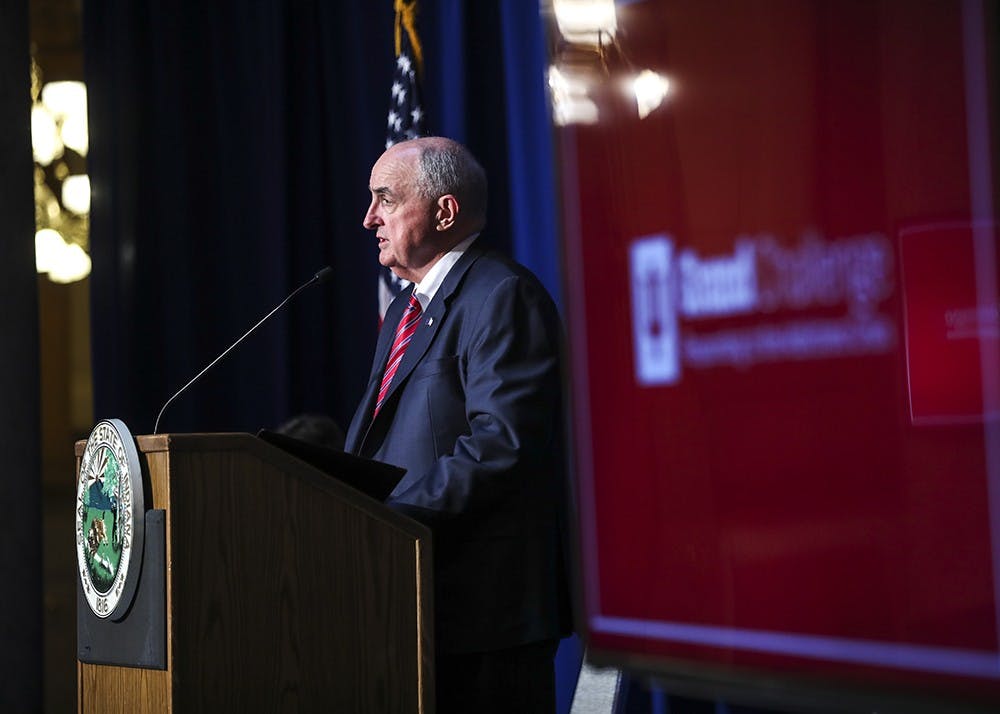INDIANAPOLIS — IU President Michael McRobbie announced a $50 million initiative to combat the growing opioid crisis Tuesday morning at the Indiana Statehouse.
He appeared alongside Gov. Eric Holcomb and leaders from the University and IU Health to announce the plan.
The initiative is the third of IU’s “Grand Challenges” program, a $300 million effort to use multidisciplinary research to solve issues facing humanity. It plans to utilize the University’s expertise in data, health, policy and law research, among other fields, to offer comprehensive solutions related to the epidemic.
Dean of the School of Nursing Robin Newhouse will lead the research team.
“To be completely candid with you all, I must confess I didn’t realize it early on in life just how big this issue was — the breadth and depth of this crisis — until really early last year, when Hoosiers started sharing with me the most personal stories,” Holcomb said. “It seemed like everywhere that I went, it quickly became apparent for me, too, that this crisis affects everyone.”
McRobbie said when he heard Holcomb say he wanted to prioritize combating drug addiction in his State of the State address in January, he sent the governor a letter pledging IU’s commitment to help.
He said since they began communicating, University officials have been working to identify how IU could help.
The presentation featured a video detailing the story of Jack and Nick Savage, two brothers who died from prescription opioid overdoses in June 2015.
Their mother, Becky Savage, sat in the front row with their younger brother.
“At the time of his death, Nick had just finished his freshman year at Indiana University,” McRobbie said.
He said the University plans to hire 10 faculty members, add other scientists and use student research to develop responses to the crisis in areas like behavioral science, government policy and medical training.
Newhouse said that with this collaboration, the University hopes to decrease opioid deaths and babies with neonatal abstinence syndrome, a byproduct of pregnant mothers who use opioids.
In 2014, 657 infants were born with the syndrome in Indiana, according to a study by the School of Public Health at IU-Purdue University Indianapolis.
“Our leaders and community have told us that to attack addictions, they need real-time data,” Newhouse said.
She said an example of this was monitoring whether a person filled opioid prescriptions at multiple pharmacies.
The governor said he has spoken to other governors from states facing a similar situation. He said they all feel as if their state is ground zero for the epidemic, and he said it was a justifiable sentiment.
Holcomb closed by saying that if he could fulfill one major accomplishment as governor of Indiana, it would be to bend the trajectory of opioid abuse downward.
“That’s really what’s so encouraging about today,” Holcomb said. “I know now that because of this historic commitment from Indiana University, the arc is starting to turn downward.”
McRobbie told the Indiana Daily Student he agreed that the fact that Bloomington, and Indiana as a whole, had been affected by these issues made it necessary for IU to be the first school to spearhead a state-based response to battling addiction.
He said the University saw an opportunity to do its part to address the crisis.
McRobbie said the University would consider how criminal justice research could fit in as an area of useful research.
He said the problem was not susceptible to a single cure but IU was capable of playing a major role with the state in addressing this issue.
“There’s no one magic bullet,” McRobbie said. “It’s going to take, really, a vast range of different interventions from legal write through to basic research in the laboratories in psychological and brain sciences, and everything in between to actually affect this issue."




